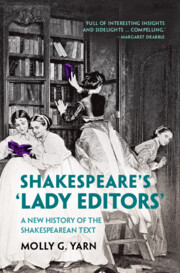Book contents
- Shakespeare’s ‘Lady Editors’
- Shakespeare’s ‘Lady Editors’
- Copyright page
- Dedication
- Epigraph
- Contents
- Figures
- Acknowledgements
- A Note on Citations
- Abbreviations
- Prologue
- Chapter 1 ‘We Have Lost Our Labour’
- Chapter 2 ‘It Is My Lady’s Hand’
- Sidenote
- Chapter 3 ‘Give Ear, Sir, to My Sister’
- Sidenote
- Chapter 4 ‘This Story the World May Read in Me’
- Chapter 5 ‘We Few, We Happy Few’
- Epilogue
- Appendices
- Works Cited
- Index
Chapter 3 - ‘Give Ear, Sir, to My Sister’
Women Editors and Scholarly Networks in America
Published online by Cambridge University Press: 19 November 2021
- Shakespeare’s ‘Lady Editors’
- Shakespeare’s ‘Lady Editors’
- Copyright page
- Dedication
- Epigraph
- Contents
- Figures
- Acknowledgements
- A Note on Citations
- Abbreviations
- Prologue
- Chapter 1 ‘We Have Lost Our Labour’
- Chapter 2 ‘It Is My Lady’s Hand’
- Sidenote
- Chapter 3 ‘Give Ear, Sir, to My Sister’
- Sidenote
- Chapter 4 ‘This Story the World May Read in Me’
- Chapter 5 ‘We Few, We Happy Few’
- Epilogue
- Appendices
- Works Cited
- Index
Summary
Chapter 3 explores the array of networks among American academic women that facilitated women’s editorial work during the fin-de-siècle period. Important scholars and writers such as Katharine Lee Bates, author of ‘America the Beautiful’; Chaucer editor Edith Rickert; and taste-making magazine editors Charlotte Porter and Helen Clarke all produced Shakespeare editions while participating in these supportive, female communities. This chapter draws on archival holdings to detail Bates’s approach to producing three editions, investigates the practice of hiring editors to revise old editions, and considers the reception and use of women’s editions.
Keywords
- Type
- Chapter
- Information
- Shakespeare's ‘Lady Editors'A New History of the Shakespearean Text, pp. 79 - 110Publisher: Cambridge University PressPrint publication year: 2021

